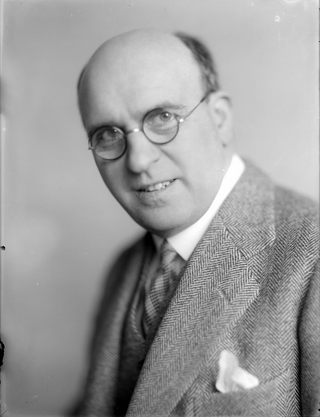Dr. Friedrich (Fritz) Löhner-Beda (geb. Bedřich Löwy)

Personalia
Born:
Died:
Profession:
Persecution:
Imprisonment 13.03.1938 - 02.04.1938,
Dachau concentration camp 02.04.1938 - 23.09.1938,
Buchenwald concentration camp 23.09.1938 - 17.10.1942,
Auschwitz concentration camp 17.10.1942 - 04.12.1942,
Murdered on 04.12.1942
KZ Number:
Memberships
Curriculum Vitae
Friedrich Löhner, known as Fritz, was born Bedřich Löwy on June 24, 1883 in Wildenschwert, Bohemia. In 1888, the Löwy family moved to Vienna and changed their name to "Löhner" in 1896. After attending elementary school and the Kundmanngeasse grammar school in Vienna's 3rd district, Fritz Löhner enrolled in law at the University of Vienna. During this time, he joins the student fraternity Kadimah Wien. He graduated in 1908 and briefly worked as a trainee lawyer.
The passionate footballer became a founding member and first president of the Hakoah sports club in 1909. He held this position until 1919, after which he became an honorary member.
In 1910, he became a freelance writer. His passion was "light poetry". He wrote numerous satires, sketches, poems and pop lyrics as well as numerous articles for newspapers such as the Wiener Sonn- und Montags-Zeitung. He mostly publishes under the pseudonym "Beda", the short form of "Bedřich", the Czech form of "Friedrich". During this time, he adopts the stage name Löhrer-Beda. In 1913 he meets Franz Lehár. In 1916 he writes the operetta libretto 'Der Sterngucker' for Franz Lehár. In 1918, Fritz Löhrer-Beda was drafted into the First World War at the age of 34. Although he reached the rank of officer, he remained an anti-militarist for the rest of his life after his war experiences. In the same year, he married Anna Akselradi and subsequently had a son with her. However, the marriage ended in divorce in 1925.
In the 1920s, Fritz Löhrer-Beda became one of the most sought-after librettists and pop lyricists in Vienna. In 1922, through his then girlfriend Friedl Weiss, he helped Hans Moser make his breakthrough as an actor in Vienna by writing the one-act solo I am the janitor of the Siebenerhaus for him at his request. In collaboration with Fred Raymond and Ernst Neubach, he wrote the song I lost my heart in Heidelberg, which continued to travel around the world with the former American soldiers after the Second World War. During this time, he becomes an honorary member of the Zionist Middle School Association Giskala Wien.
In 1925, he marries Helene Jellinek and subsequently has two daughters with her, Liselotte and Evamaria.
From 1927, he also works for Oscar Teller's "Jewish Political Cabaret".
Together with Ludwig Herzer as co-author, Franz Lehár as composer and Richard Tauber as singer, he created the operettas Friederike (1928), Das Land des Lächelns (1929), Schön ist die Welt (1930) and, with Paul Knepler as co-author, Giuditta. With his friend Alfred Grünwald as co-author and Paul Abraham as composer, he produced Viktoria und ihr Husar (1930), Die Blume von Hawaii (1931), Ball im Savoy (1932) and Märchen im Grand Hotel (1934).
In 1934, Fritz Löhrer-Beda became vice president of the Austrian Society of Authors, Composers and Music Publishers. In the same year, he came into the special focus of the German National Socialist 'Reichsdramaturge' Rainer Schlössler and the German National Socialist Reich Propaganda Minister Joseph Goebbels.
On March 12, 1938, Fritz Löhrer-Beda witnessed the downfall of free and independent Austria with the invasion of the German Wehrmacht. On March 13, 1938, according to other sources on March 14, 1938, he was arrested and deported with the so-called Prominent Transport to the Dachau concentration camp on April 2, 1938. From there, he was deported to the Buchenwald concentration camp on September 23, 1938, where he wrote the Buchenwald Song (lyrics: Fritz Löhrer-Beda; melody: Hermann Leopoldi) with the composer Hermann Leopoldi at the end of 1938.
When the day awakens before the sun shines,
the columns march to the day's toil
into the gray morning.
And the forest is black and the sky red,
and we carry a piece of bread in our sack
and in our hearts, in our hearts the sorrows.
O Buchenwald, I cannot forget you,because you are my destiny.
Whoever left you can only appreciate
how wonderful freedom is!
O Buchenwald, we do not whine and complain,
and whatever our fate,
||: we still want to say yes to life,
because one day the day will come: then we will be free! And the blood is hot and the girl is far away,and the wind sings softly, and I love her so much,
if only she would remain faithful, yes, faithful!
And the stones are hard, but our footing is firm,
and we carry the picks and spades with us
and in our hearts, in our hearts love.
O Buchenwald, I cannot forget you ...
And the night is short, and the day is so long,but a song rings out that the homeland sang:
We will not let our courage be stolen.
Keep up, comrade, and do not lose heart,
because we carry the will to live in our blood
and in our hearts, in our hearts faith.
O Buchenwald, I cannot forget you ...
On October 17, 1942, Fritz Löhrer-Beda is transported to the Auschwitz concentration camp
Places
Residence:
Persecution:
Death Place:
Honoring:
Citations
Gatscher-Riedl, Gregor Privatarchiv
Wikipedia unter de.wikipedia.org/wiki/Fritz_Löhner-Beda
Dokumentationsarchiv des österreichischen Widerstands (DÖW)
